This is the newsletter version of Sara by the Season, where I explore a little bit of everything that’s on my mind as I try to lean into nature’s wisdom and rhythms. You can listen to me read you the newsletter by hitting play above - or you can click the little link above and to the right to play in your favorite podcast player. If you know someone who would like this sort of thing, I’d be so grateful if you would share it!
At work, I’ve been researching the “collegiate mental health crisis.” To save you from reading a ton of upsetting research, the kids are not alright. More than 60 percent of today’s college students meet the criteria for at least one mental health diagnosis; one in seven college students said they contemplated suicide in the past year; the data is staggeringly depressing. But what’s interesting to me is that they’re also the generation with the most access to (and least stigma associated with) mental health services and pharmaceuticals, which leads me to wonder about what else is going on here.
Don’t get me wrong: I’m a huge fan of increased access to mental health services and pharmaceuticals when needed. Generation Z could contribute nothing else in addition to the way they’ve de-stigmatized mental health struggles, and I would consider them one of our greatest generations.
Instagram can be a cesspool, but one follow that has really made me think over the years is @decolonizingtherapy. I can’t find a specific post to point you to (but maybe this is a decent summary), but she regularly makes the point that the way we think about therapy and mental health more generally is hyper-individualized, colonized, patriarchal, dualistic, Western, and super white.
We make mental health struggles about individual problems when so much of what we’re collectively facing - and struggling with - are due to systems problems. While an hour once a week discussing your trauma, depression, and anxiety is better than nothing, what is an hour of the week in comparison to the systemic forces that led to your trauma, depression, and anxiety in the first place - and that you can pretty easily trace back to living in a productivity-obsessed culture steeped in corporate greed in a time of climate emergency with a side of every -ism you can think of depending on how many marginalized groups you belong to?
Even self-care is this thing that has been co-opted by capitalism, laden with should energy, keeping us constantly feeling like we’re never doing enough - even for ourselves.
I love my therapists, but how often have you left therapy feeling like maybe you would’ve been better off just meeting a friend for a walk instead? Or setting aside some time to have a cup of tea with your partner to talk about your relationship? Or maybe just journaling for an hour and listening to your own still, small voice for once? Just me
Dr. Jennifer Mullan of @decolonizingtherapy (and plenty of others) would say that we’ve handed off what used to be the responsibility of the collective community to mental health professionals. The community used to help us avoid conditions that led to so many of the problems we face today in the first place1. Additionally, our communities had rituals, rites of passage, built-in support structures, and communal practices around potentially trauma-inducing events like death, violence, and natural disasters.
Inextricably woven into much of that communal carrying was the spiritual tradition and practices of said community. The spiritual traditions were the scaffolding that allowed the community to function and, in some cases, thrive. Now, I’ll be the first to own up to all of the problems associated with spiritual communities. I am on the Board at our ELCA church, and I have a hard time even telling people I’m a Christian these days - at least not without a ton of caveats.2
And. Leaving our spiritual communities altogether has left a vacuum where at least some form of community used to fill in the gaps. I know a bunch of Trump voters who spend far more time on Fox News and the like than they do at their respective church’s or at their church’s activities in their respective communities. Their hyper-partisan politics has filled the vacuum that religion used to fill (or even worse is when religion is in bed with the hyper-partisan politics, which we’re seeing all over the place these days). Others have filled the vacuum with kids’ sports teams or book clubs or breweries or yoga studios.
But here’s the thing: I belong to several serious kids’ sports teams, book clubs, am a mug club member at my local brewery, teach at a local yoga studio, and attend a mainline (albeit funky for central Indiana) church. None of them are providing me the support that I want or need3; the kind that Dr. Mullan talks about when she talks about all that we’ve collectively lost to colonization when it comes to our mental wellness.
We aren’t going back to living together in small villages where we all share the same spiritual beliefs and practices (although I’m in for whoever wants to join), and obviously, many of those communities had their own problems. But the fact remains that we’ve collectively freed ourselves from the shackles that organized religion used to provide, but we have nothing to replace it, which has left us dis-eased (literally dis-at-ease) individually and collectively.
The white Christian nationalist folks have obviously used this disequilibrium to argue - or to blatantly put into policies that the rest of us have to live under - that we need to go back to some fantasy utopia where they can control everything and everyone. But the rest of us aren’t offering that many great alternatives to this human need for community structures to help us handle all that life throws at us. I love my yoga studio, but they didn’t help me throughout the long months of this year that we were the primary caregivers for our aunt who was dying. Hell, they didn’t even know about her because that requires some level of vulnerability on my part that I just didn’t feel like offering4.
I don’t have any solutions to this problem and am obviously not the first (or hundredth) to identify it, but I can’t help but see the connections between our “mental health crisis” and the insufficient - or even harmful - ways in which we’ve been trying to address it.
I’ve been reading some indigenous writers lately (Erdrich, Yonkaporta, Curtice), and one thing that has become obvious in my reading is the grief at the loss of the carrying capacity that the community provides. In these stories, the burdens are spread out, so that it’s a lighter burden for all. While the indigenous among us have done a far better job of maintaining these communal containers despite the overwhelmingly evil forces trying to dismantle their communities, rituals, and spirituality, this communal scaffolding was something that all human cultures had up until very recently. For us white folks, our wealth and privilege has enabled us to get by better without it - at least on paper - but we’re all suffering from its absence.
It feels like another instance in which the pendulum has swung too far in one direction when the answers we need lie somewhere in a middle where we could learn from the mistakes of the past, integrate the lessons we’ve learned, and build something new.
Scattering Seeds
I’m always finding stuff that supports the thesis of the book I’m writing on the benefits of leaning into nature’s wisdom, so I thought I could start sharing those links and things here with all of you in hopes of some of the seeds I share germinating into something beautiful at your place.
Some more #griefseason reading: it’s all saints day, not some saints day.
I came across this beautiful bit in one of my journals about the unique grief and letting go required of parenthood from Robin Wall Kimmerer’s Braiding Sweetgrass and haven’t been able to stop thinking about it this week:
I had known it would happen from the first time I held her – from that moment on, all her growing would be way from me. It is the fundamental unfairness of parenthood that if we do our jobs well, the deepest bond we are given will walk out the door with a wave over the shoulder. We get good training along the way. We learn to say, “Have a great time, sweetie” while we are longing to pull them back to safety. And against all the evolutionary imperatives of protecting our gene pool, we give them car keys. And freedom. It’s our job.
AHP had a great conversation about how to ask for and offer help on her Instagram stories this week. She has such a great readership that is always worth listening to, and the conversation she hosted this week offers some practical ways to build our own communities that play into the conversation I was trying to start above.
Some Rilke for these days:
The leaves are falling, falling as if from far up,
as if orchards were dying high in space.
Each leaf falls as if it were motioning "no."
And tonight the heavy earth is falling
away from all other stars in the loneliness.
We're all falling. This hand here is falling.
And look at the other one. It's in them all.
And yet there is Someone, whose hands
infinitely calm, holding up all this falling.
- Autumn - Rainer Maria Rilke
Cheers to sharing the burdens and joys in the season ahead,
Sara
Ask any American parent of young children about their experience of “the village” for just a taste of examples of things that our community and family structures used to support but no longer do.
Watched this last week and might be trying to memorize every talking point.
Something I want to delve into more deeply but don’t have the space for here is my responsibility in building these types of communities. I can’t be upset about the lack of carrying capacity of these various communities unless/until I’m doing a fair share of carrying too!
To be clear, I don’t think it’s my yoga studio’s job to help out with my dying aunt; my point is that even though we might have these alternate communities, are they really helping us with the practical day-to-day joys and sorrows of life?




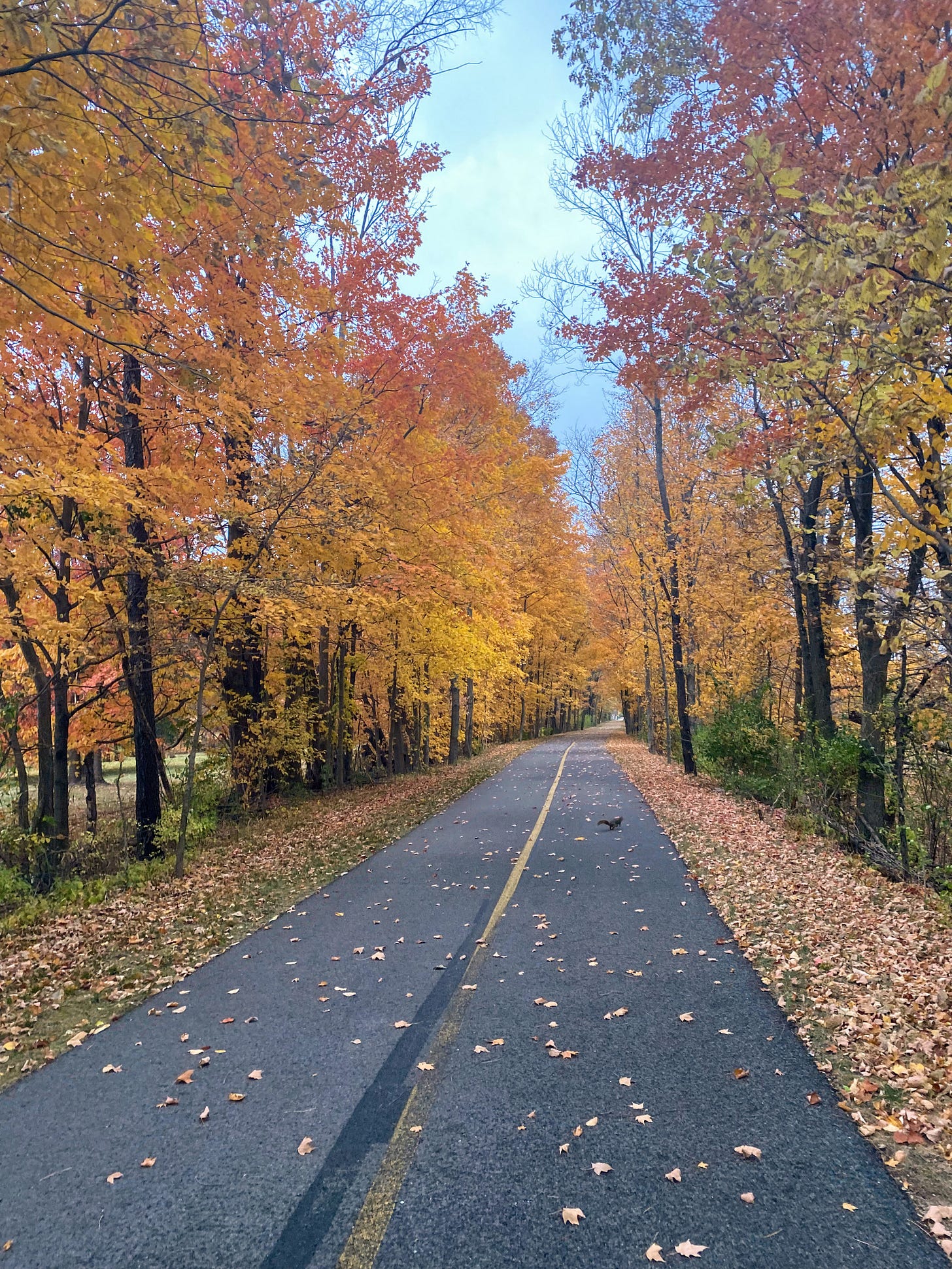

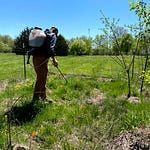
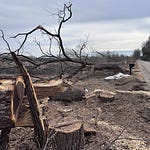




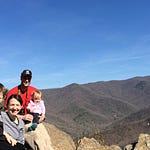
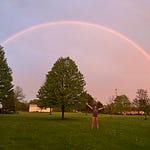
Share this post